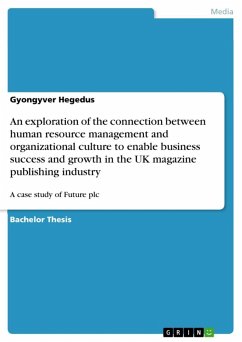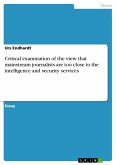Bachelor Thesis from the year 2010 in the subject Communications - Journalism, Journalism Professions, grade: 2:1, University of London (London College of Communication, London University of the Arts London), language: English, abstract: This research bridges the relationship between strategic human resource management and organisational culture to enable business success and growth in the magazine publishing industry based on a case study of Future plc, one of the leading companies in the specialist magazine sector in the UK. The specific aims that were accomplished over the course of this investigation include an exploration of the extant literature regarding organisational culture and strategic human resource management; a presentation of theory and empirical evidence regarding the impact of human resource management and organisational culture on organisational development; and the completion of a case study of Future Plc. A research strategy was to use a mixed-method survey that was administered to a selected group of Future Plc managers, offering evidence of policies, strategies, and expectations that continue to govern employee hiring, motivation, training, and long term development, and to follow a traditional case study format. The primary research was based on a variety of books and academic journals to search for key terms that were relevant to the main topic. The survey was divided into three segments, the first two were made up of quantitative queries and the third was based on open-ended qualitative questions. The findings suggested that there is an innate connection between communications, employee motivation and business success.. Future plc motivates its employees by providing access to comprehensive tailor-made internal training, formal appraisal, recognition and the possibility of promotion instead of offering more money. The company currently epitomises the focus on strengths of organisational participants, as its varied branches are thinned and refocused towards more specific long term objectives. Managers queried, agreed that in order to establish a successful protocol for long term growth, cultural commitment must be maintained and that business success and development needs long-term objectives, although at present it seems that there is a lack of agreement between the expectation of partnership and its practice within the company. The survey findings suggested that managers believe, it is not important to hold regular meetings to inform staff about the changes that takes place within the company and that the departments do not communicate effectively resulting in bad performance. [...]
Dieser Download kann aus rechtlichen Gründen nur mit Rechnungsadresse in A, B, BG, CY, CZ, D, DK, EW, E, FIN, F, GR, HR, H, IRL, I, LT, L, LR, M, NL, PL, P, R, S, SLO, SK ausgeliefert werden.









